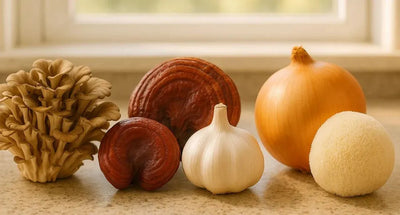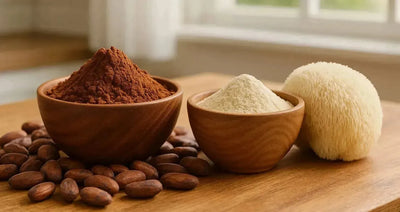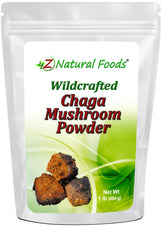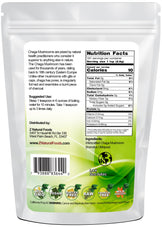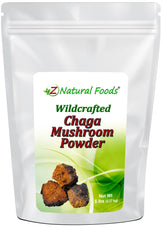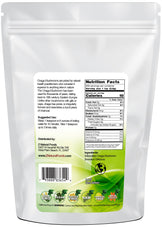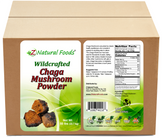Description
Description
Mushrooms have long been prized for their medicinal benefits. In the last few years, scientific studies have highlighted the neuroprotective value of some mushrooms, which could promote brain well-being, improve memory, and increase mental acuity. Most mushrooms add wonderful flavor to our dishes, but some are specifically helpful for cognitive functioning, memory, and overall brain well-being. In today's blog, we will discover certain mushrooms that enhance brain function, improve focus, and protect against age-related cognitive decline.
Boost your brain health with the powerful blend of organic mushrooms—shop now at Z Natural Foods!

Which mushroom is good for the brain?
Mushrooms are more than a delicious pizza topping. They may also help protect against certain problems such as anxiety, Alzheimer’s, and depression. This may be because they contain vital nutrients such as vitamin D, dietary fiber, protein, potassium, complex carbohydrates, selenium, beta-glucans, minerals, and other supportive phytochemicals. They are called a superfood because they offer a wide variety of important nutrients.
Mushrooms come in various types, each of which has a unique importance to the body.
When it comes to improving brain health, three kinds of mushrooms stand out amongst the 10,000 species of mushrooms, while one, in particular, is most popular for brain health (see answer below):
Lion’s Mane Mushroom
Lion’s Mane (Hericium Erinaceus) is a culinary-medicinal mushroom with an Eastern Asia origin. A round shape and long hair-like structures characterize it. This mushroom may have excellent effects on brain health, as it may play an important role in repairing damaged neurons within the brain. Also, Lion’s Mane stimulates the synthesis of proteins that support neuron growth, referred to as Nerve Growth Factor (NGF). The most common way of incorporating Lion’s Mane into your diet is by adding it to food in powder form.
Red Reishi mushroom
The Reishi mushroom (Ganoderma lucidum) is essential for your brain health and has been used in Japanese and Chinese medicine (TCM) for hundreds of years. It is known for its ability to balance moods and hormones. Reishi may improve brain function by balancing the endocrine system. This balance helps you keep feeling good even when stressed or depressed. Additionally, Reishi may help improve your concentration and help you sleep better.
The most common type of Reishi mushroom is Red Reishi powder, which may support mental and neurological well-being. Red Reishi is primarily available as mushroom powder from red reishi mushrooms found on linden chips from a family of trees called “Tila.”
Cordyceps mushroom
The Cordyceps mushroom is of Chinese origin, and its use in medicine started over 1,300 years ago. It may improve brain function by having anti-inflammatory and antioxidant benefits. Cordyceps may support your brain through its energizing effects from beta-glucans that are known to deliver oxygen to the blood. Cordyceps mushroom is available in capsule and powder form. However, the most common form is a powder that can be taken alone or added to food.
4. Chaga: The Immune Booster with Brain Benefits
Chaga (Inonotus obliquus) is a mushroom regularly used in tea for its astounding health benefits. It possesses anti-inflammatory and antioxidant properties, which can play an important role in brain health. Chaga's active ingredients, like betulinic acid, can protect the brain from free radicals and oxidative stress, which can lead to cognitive impairments.
Chaga mushrooms are also full of melanin, which protects brain cells from age-related deterioration. This potent mushroom maintains the body's overall immune health, supporting mental clarity and memory by safeguarding the brain against internal damage by free radicals.
5. Shiitake: A Tasty, Brain-Boosting Mushroom
Shiitake mushrooms are endowed with various antioxidants that protect the brain from oxidative stress, which leads to cognitive impairment and memory loss. These fungi contain lentinans and other beta-glucans, which enhance the body's natural capability to repair and regenerate brain cells.
Other than supporting brain health, Shiitake mushrooms are full of nutrients that can help elevate mood and alleviate symptoms of depression and anxiety, which negatively impact cognitive function. In supporting mental health, Shiitake can help improve memory and concentration, making it an excellent choice for overall brain wellness.
6. Maitake: The Cognitive Enhancer
Maitake mushrooms, scientifically known as Grifola frondosa, are another medicinal mushroom widely used for their health benefits, including their positive effects on brain health. Maitake contains powerful antioxidants and anti-inflammatory compounds that protect the brain and support nerve regeneration. These properties help reduce the risk of cognitive decline as we age.
Maitake mushrooms enhance memory and other mental performance by facilitating more effective information absorption and processing inside the brain. Since they contain components that promote nerve regeneration, they may also become a viable supplement for old-age mind-related decline.
7. Turkey Tail: Boosting Your Brain and Immunity
Turkey Tail (Trametes versicolor) is a mushroom used for its immune-boosting properties and significant benefits for cognitive health. It contains a unique compound known as polysaccharide-K (PSK), which has been shown to have neuroprotective effects.
Studies show that Turkey Tail aids in improving memory and concentration by boosting the immune system and shielding against mental decline. Its antioxidant and anti-inflammatory effects may further ward off oxidative stress-induced brain damage. As the brain ages, such safeguards are even more essential to sustain long-term mental well-being.
So what is the most popular choice of mushroom for brain health?
Lion’s Mane tops the list. Here’s why:
How does Lion’s Mane affect the brain?
As discussed above, Lion’s Mane is one of the most critical mushrooms for brain health. It affects the brain in the following ways;
Fostering the production of the bioprotein nerve growth factor (NFG) and myelin
Bioprotein nerve growth factor (NFG) and myelin are insulators around nerve fibers and are critical to the brain’s health. An imbalance in these insulators can contribute to neurological issues such as Alzheimer’s and multiple sclerosis. Lion’s Mane mushrooms may help maintain this balance, making them stand out among other brain foods.
Improve cognition
Though research is still being carried out, an experiment conducted on animals showed that this miraculous mushroom might improve cognition by increasing concentration, reducing irritability, and alleviating anxiety.
Reverses neurological disorders
Unlike other kinds of mushrooms, Lion’s Mane mushrooms may stimulate NGF synthesis in people with a neurological disorder and may help with the damage. This shows that Lion’s Mane mushroom may help prevent brain-related problems such as Parkinson’s, Alzheimer’s disease, and Dementia, but it may also help provide solutions.
How long does it take Lion’s Mane to work?
Much like using any other medicinal mushroom mix or herbal supplement, the health benefits of Lion’s Mane will take a bit of time to show. However, in most cases, Lion’s Mane will take around two weeks before you may start noticing or feeling any difference. However, this is different from one individual to another.
Frequently Asked Questions
What mushroom is best for memory?
Lion's Mane is rated as one of the greatest mushrooms for enhancing memory because it can promote the production of nerve growth factor (NGF), which is critical for memory and cognitive processes.
Can Cordyceps enhance mental focus?
Yes, Cordyceps enhances mental focus and concentration. It achieves this by maintaining healthy circulation so the brain can be supplied with plenty of oxygen and nutrients to remain focused.
Are mushrooms such as Reishi and Shiitake good for our brains?
Indeed, both types of mushrooms—reishi and Shiitake—possess antioxidant and anti-inflammatory properties useful in preventing brain stress due to oxides, improving memory, and enhancing general intellectual ability.
